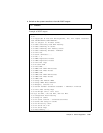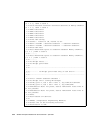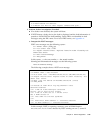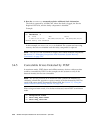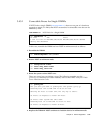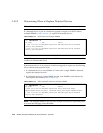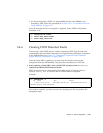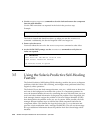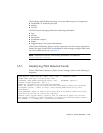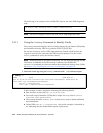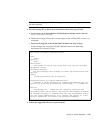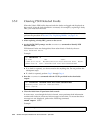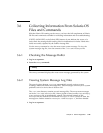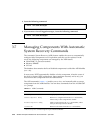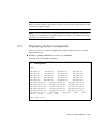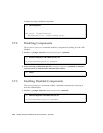
Chapter 3 Server Diagnostics 3-41
The Predictive Self-Healing technology covers the following server components:
■ UltraSPARC T1 multicore processor
■ Memory
■ I/O bus
The PSH console message provides the following information:
■ Type
■ Severity
■ Description
■ Automated response
■ Impact
■ Suggested action for system administrator
If the Solaris PSH facility detects a faulty component, use the fmdump command to
identify the fault. Faulty FRUs are identified in fault messages using the FRU name.
For a list of FRU names, see Appendix A.
Note – Additional Predictive Self-Healing information is available at:
http://www.sun.com/msg
3.5.1 Identifying PSH Detected Faults
When a PSH fault is detected, a Solaris console message similar to the following is
displayed:
SUNW-MSG-ID: SUN4V-8000-DX, TYPE: Fault, VER: 1, SEVERITY: Minor
EVENT-TIME: Wed Sep 14 10:09:46 EDT 2005
PLATFORM: SUNW,SPARC-Enterprise-T2000, CSN: -, HOSTNAME: wgs48-37
SOURCE: cpumem-diagnosis, REV: 1.5
EVENT-ID: f92e9fbe-735e-c218-cf87-9e1720a28004
DESC: The number of errors associated with this memory module has exceeded
acceptable levels. Refer to http://sun.com/msg/SUN4V-8000-DX for more
information.
AUTO-RESPONSE: Pages of memory associated with this memory module are being
removed from service as errors are reported.
IMPACT: Total system memory capacity will be reduced as pages are retired.
REC-ACTION: Schedule a repair procedure to replace the affected memory module.
Use fmdump -v -u <EVENT_ID> to identify the module.



